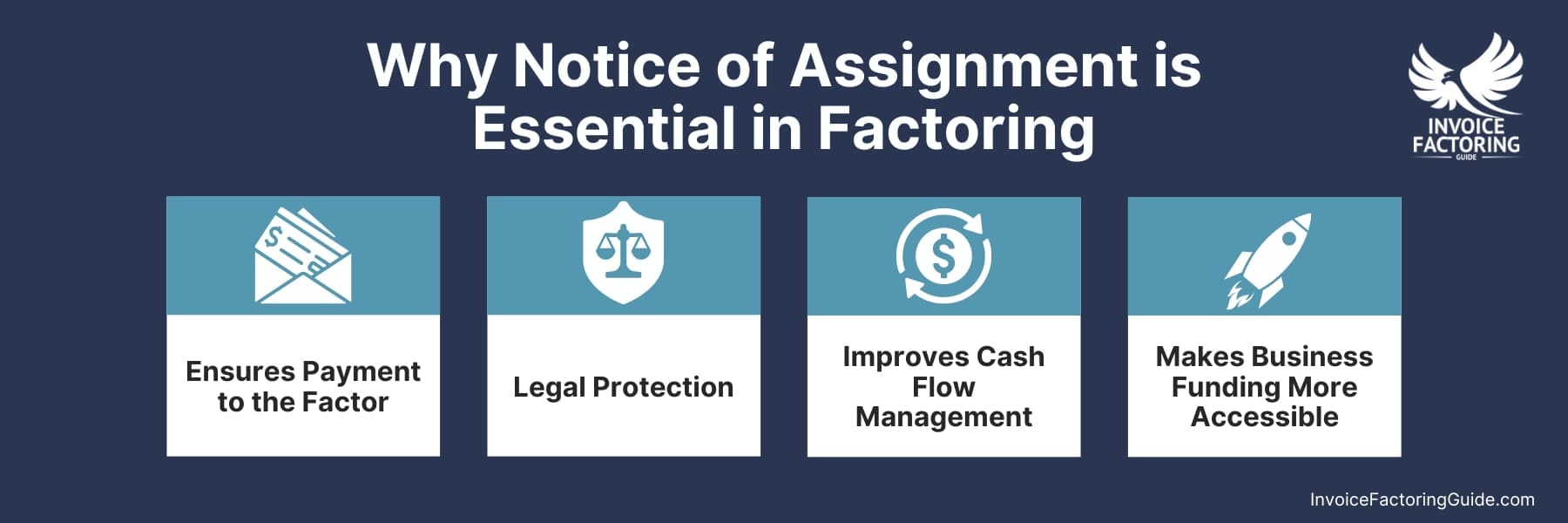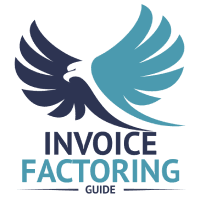
You’ve just fulfilled a large order, but the payment is still 60 days away. In the meantime, you’ve got bills to pay and payroll to cover. Invoice factoring can bridge that gap and keep your business running smoothly. However, sometimes businesses have concerns related to notifying their customers about their factoring agreement or what that entails. On this page, we’ll walk you through how notice of assignment (NOA) factoring works, best practices for sending notices, and alternatives to NOAs if you’d like to keep your factoring agreement to yourself.
How Traditional Factoring Works
Invoice factoring is a financial solution that allows businesses to improve their cash flow by selling their outstanding invoices to a third party, known as a factor. This process provides immediate cash to the business, rather than waiting 30, 60, or even 90 days for their customers to pay. Here’s how it works in simple steps.
- Issuing Invoices: A business provides goods or services to a customer and issues an invoice, typically with a payment term of 30, 60, or 90 days.
- Selling the Invoice: Instead of waiting for the customer to pay, the business sells the invoice to a factoring company. The factor pays the business a significant portion of the invoice’s value upfront—usually around 60 to 95 percent.
- Receiving Immediate Cash: The business now has immediate cash flow, which can be used to cover expenses, invest in growth, or manage day-to-day operations.
- Customer Payment: The customer eventually pays the invoice, but instead of paying the original business, they pay the factoring company. Once the payment is received, the factor gives the business the remaining balance, minus a small fee for their services.
This process helps businesses maintain steady cash flow, particularly when dealing with slow-paying customers, allowing them to focus on growth and operations without worrying about delayed payments.
Notice of Assignment Explained
A notice of assignment is a formal document that informs a business’s customer that their invoice has been sold to a factoring company. Essentially, it lets the customer know that they should pay the invoice amount directly to the factor, not the original business. This notice is usually sent by the factoring company after the agreement is finalized.
Why Notice of Assignment is Essential
The notice of assignment serves several important purposes in the factoring process.

Ensures Payment to the Factor
By notifying the customer, the factor ensures that the payment is directed to them, which is crucial since the factor has already provided the business with upfront cash for the invoice. Without this notice, the customer might mistakenly pay the original business, complicating the transaction and potentially causing financial losses or disputes.
Legal Protection
The notice of assignment provides legal backing to the factor’s right to collect payment on the invoice. It makes the transaction transparent and minimizes the risk of double payment or fraud. If a customer fails to pay the factor after receiving a notice of assignment, the factor can take legal action to enforce the payment.
Improves Cash Flow Management
From the business’s perspective, issuing a notice of assignment can help improve relationships with the factor. Since the factor has confidence that payments will be received as agreed, the business may benefit from better terms, such as higher advance rates or lower fees.
Makes Business Funding More Accessible
Businesses, especially those that are smaller, haven’t been in operation long, or don’t have strong credit, often have trouble securing funding. There also tends to be red tape in the funding process and it can take a while for options like loans and lines of credit to pay out. Conversely, it’s easy to get approved for factoring because the factor is more concerned about the creditworthiness of your clients. Payout occurs quickly, too. A business can be approved in a couple of days or less. Payment for an invoice usually occurs within two business days as well, though some factors offer same-day payments.
All of this is made possible because of the unique way factoring works and the sale of the invoice. Because the NOA is a legal component of this transaction, it plays a crucial role in making funding more accessible.
Legal Basis for the Notice of Assignment
The requirement for a Notice of Assignment comes from several legal principles and statutes, depending on the jurisdiction. Here are some key aspects.
Assignment of Receivables
In general contract law, an assignment is the transfer of rights or property from one party to another. When a business assigns its receivables (invoices) to a factoring company, it is transferring the right to collect payment on those invoices. To make this assignment effective, the debtor (the customer who owes the money) must be notified. This is where the notice of assignment comes into play.
Uniform Commercial Code (UCC) in the United States
In the U.S., the assignment of receivables is governed by Article 9 of the Uniform Commercial Code (UCC). The UCC provides a standardized set of laws that regulate commercial transactions, including the assignment of accounts receivable. The notice of assignment is not just a formality. It’s a requirement under the UCC to ensure that the debtor is aware of the new party entitled to receive payment. Without this notice, the debtor might still be legally obliged to pay the original creditor, which could create complications.
Legal Protection and Priority
The NOA also helps establish the factor’s priority in the event of the original business’s bankruptcy or other legal issues. By sending an NOA, the factor ensures that their right to the receivable is recognized and prioritized over other creditors. This is crucial in maintaining the security of the transaction.
Best Practices When Sending NOAs
When it comes to managing the process of sending an NOA, it’s crucial for businesses to be well-prepared and proactive. While the factoring company usually handles the actual sending of the NOA, the business still plays a vital role in ensuring a smooth transition and maintaining positive relationships with their clients. Here are some best practices to keep in mind.
Review the NOA Before It’s Sent
Ask the factoring company for a copy of the NOA before it goes out, and collaborate with them to make adjustments as needed.
Ensure Accuracy
Carefully review the document to ensure all details are correct. This includes verifying the invoice numbers, amounts, and any other pertinent information. Mistakes in the NOA can lead to confusion or delays in payment, so it’s essential to get it right the first time.
Tailor the Communication
Some factors may allow customization of the NOA to fit the tone and style of the business. If possible, the business should work with the factor to ensure that the NOA aligns with their brand and customer communication style. This can help maintain trust and professionalism.
Prepare Clients Ahead of Time
Transparency and how you frame factoring can make a difference in how your clients respond to the NOA.
Inform Key Clients Personally
Especially with major clients, it’s a good idea for the business to inform them about the upcoming NOA before they receive it. This can be done through a phone call or a personalized email. Letting clients know why the business is factoring invoices to manage cash flow and continue providing excellent service can reassure them and prevent any surprises.
In addition to clear communication, businesses can benefit from working with providers that specialize in unpaid invoices solutions. These partners not only help secure faster payments but also reduce the risk of disputes or strained relationships when customers delay settling their accounts.
Address Concerns
Clients may have questions or concerns about the NOA and what it means for their relationship with the business. Being proactive in addressing these concerns can prevent misunderstandings and maintain a positive working relationship.
Monitor Client Responses
Keep an eye out for responses and be ready to step in as needed.
Follow Up After Sending
After the NOA has been sent, the business should follow up with their clients to ensure they received it and understand the new payment instructions. This is especially important for key accounts or clients who have large outstanding invoices.
Handle Delays or Issues Promptly
If a client is slow to respond to the NOA or seems confused, the business should step in to help clarify any issues. Promptly addressing any problems can prevent payment delays and ensure that the factoring process goes smoothly.
Maintain Clear Records
Because NOAs are generally required by law, it’s important to keep good records.
Document Everything
It’s important for the business to keep thorough records of all communications related to the NOA. This includes copies of the NOA itself, any emails or letters sent to clients, and notes from phone calls. This documentation can be invaluable if any disputes arise later.
Coordinate with the Factor
Ensure that the business and the factoring company are on the same page regarding all details of the NOA. This includes confirming when the NOA was sent and ensuring that both parties have consistent information.
Reinforce the Relationship
Even though the factoring company is collecting payments, your clients will continue working with you on everything else. Reinforcing this relationship early as NOAs are going out can help ensure your clients remain confident that they’re going to continue receiving the same service from you.
Reiterate the Business’s Commitment
After sending the NOA, the business should take steps to reinforce its relationship with the client. Reassuring the client that the quality of service and the business relationship will remain unchanged can help alleviate any concerns they might have about the assignment.
Provide Additional Support
Offer to answer any questions or provide additional information about the factoring process. This demonstrates transparency and builds trust with the client.
Address Potential Payment Discrepancies
Although issues are rare, being prepared for them will help ensure the process goes smoothly for everyone involved.
Prepare for Discrepancies
Despite best efforts, there might still be cases where a client accidentally pays the business instead of the factor. The business should have a plan in place to quickly redirect these payments to the factor and communicate this process clearly to the client.
Ensure Seamless Payment Transitions
Work closely with the factor to ensure that payment transitions are seamless. The factor might require additional documentation or communication if issues arise, so maintaining open lines of communication is key.
Factoring without Notification

Factoring without a notice of assignment, commonly known as non-notification factoring, is an alternative form of invoice factoring where the customer (debtor) is not informed that their invoice has been sold to a factoring company. This type of factoring offers a different set of advantages and considerations compared to traditional factoring with an NOA.
Non-Notification Factoring Explained
In non-notification factoring, the business continues to handle its invoicing and collections as if the factoring arrangement doesn’t exist. The customers pay the invoices directly to the business, and the business then forwards the payment to the factoring company. The customers remain unaware that the invoices have been sold to a third party.
Why Businesses Choose Non-Notification Factoring
There are several reasons why a business might opt for non-notification factoring.
Maintaining Customer Relationships
Some businesses prefer not to disclose their use of factoring to their customers. This could be because they want to maintain a perception of financial stability or avoid giving customers any reason to question the company’s liquidity.
By keeping the factoring arrangement confidential, the business can preserve its brand image and avoid any potential stigma associated with factoring.
Flexibility in Operations
Non-notification factoring allows the business to maintain control over its invoicing and collections processes. This can be beneficial for businesses that have established strong relationships with their customers and prefer to handle communications directly.
The business can continue to operate as usual without any noticeable changes in the customer experience.
Minimized Impact on Client Trust
In some industries, clients may have concerns or misunderstandings about factoring, seeing it as a sign of financial distress. Non-notification factoring allows businesses to avoid these potential issues and continue their operations without disrupting client trust.
How Non-Notification Factoring Works
The process of non-notification factoring is similar to traditional factoring, with a few key differences. Although each factoring company operates uniquely, some common differences between notification and non-notification factoring are covered below.
Invoice Creation
The business issues invoices to its customers as usual. The invoices do not mention the factoring arrangement, so the customer is unaware that the invoice has been sold.
Sale of Invoices
The business sells its invoices to the factoring company, just like in traditional factoring. The factor provides an advance on the invoice.
Customer Payment
The customer pays the invoice directly to the business, not the factor. The business then forwards the payment to the factoring company, after which the factor releases the remaining balance, minus any fees.
Confidentiality
Throughout this process, the customer remains unaware of the factoring arrangement, as all communications and payments are handled directly by the business.
Considerations and Challenges of Non-Notification Factoring
While non-notification factoring offers certain advantages, it also comes with specific challenges.
Higher Costs
Non-notification factoring is generally more expensive than traditional factoring with an NOA. This is because the factor assumes more risk by not being directly involved in the collection process. The factor must rely on the business to remit payments promptly, which increases their risk and costs.
Creditworthiness and Trust
Factoring companies typically offer non-notification factoring only to businesses with strong credit and trustworthy management. Since the factor is not involved in collections, they need to have confidence that the business will manage the process efficiently and honestly. This is in contrast to traditional factoring, as factors typically focus more on the creditworthiness of the clients paying the invoices.
Potential for Mismanagement
There’s a risk that the business might delay forwarding payments to the factor, whether intentionally or due to cash flow issues. This could strain the relationship between the business and the factor, potentially leading to complications in the factoring agreement.
Limited Availability
Not all factoring companies offer non-notification factoring. Those that do may have stricter requirements for businesses to qualify, making it less accessible for some companies.
Accelerate Your Cash Flow with Factoring
NOAs are a part of most factoring agreements and rarely create any friction in the process for businesses or their customers. However, if you prefer for your factoring to have a lower profile, you can opt for non-notification factoring instead. Invoice Factoring Guide can match you with a factor offering your preferred method at no cost to you and with no obligation to retain their services. If you’d like to take the first step toward accelerating your cash flow, request a complimentary rate quote.
Notice of Assignment & Factoring FAQs
Why is a Notice of Assignment required in factoring agreements?
The NOA is required to inform customers that they should pay the factor instead of the original business. It legally secures the factor’s right to collect the payment, reducing the risk for the factor. This process helps ensure that factoring agreements operate smoothly, making it easier for businesses to access quick funding.
How does a Notice of Assignment impact my customers?
The NOA informs your customers that they must pay the factoring company directly. It doesn’t change the amount they owe or the payment terms, but it does shift the recipient of their payment. Clear communication about this change helps maintain trust and ensures a seamless transition for your customers.
Can my business qualify for factoring without strong credit?
Yes, factoring companies focus more on the creditworthiness of your customers than your business’s credit history. This makes factoring accessible to businesses with weaker credit or limited operating history. As long as your customers have a reliable payment record, your business can likely qualify for factoring.
How quickly can I get approved for factoring?
The approval process for factoring is typically much faster than traditional loans, often taking just a couple of days. Some factors can approve your business and provide funding within 24 hours. Once approved, payments on factored invoices can be received within one to two business days, with some factors offering same-day payments.
What are the benefits of factoring compared to traditional loans?
Factoring offers quicker access to cash, easier qualification, and doesn’t require collateral like traditional loans. Instead of focusing on your business’s credit, factoring relies on your customers’ ability to pay. This makes it a great option for businesses needing immediate cash flow without taking on debt.
Does factoring require collateral like a traditional loan?
No, factoring doesn’t typically require collateral like a traditional loan. Instead, the invoices themselves serve as the collateral. This makes factoring accessible to businesses that might not have significant assets but have reliable customers who pay their invoices on time.
How does non-notification factoring differ from factoring with a notice of assignment?
In non-notification factoring, your customers are not informed that their invoices have been sold to a factor. You continue to collect payments as usual and then forward them to the factor. This method keeps the factoring arrangement confidential but may come with higher costs and is typically available only to businesses with strong credit.
How does the creditworthiness of my clients affect my ability to factor invoices?
The creditworthiness of your clients is crucial in factoring. Factors are primarily concerned with whether your clients are reliable and pay their invoices on time. If your clients have strong payment histories, your business is more likely to qualify for factoring, even if your own credit isn’t strong.

About Invoice Factoring Guide
Related Insights
Get an instant funding estimate
Results are estimates based on the calculated rate and the total invoice amount provided.
Actual rates may vary.
Request a Factoring Rate Quote
PREFER TO TALK? Call us at 1-844-887-0300










